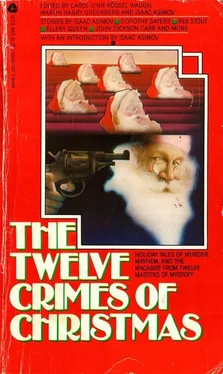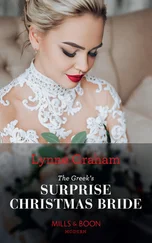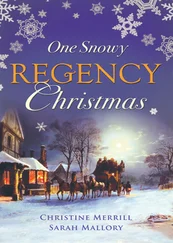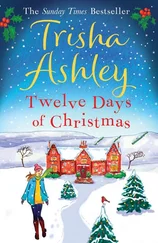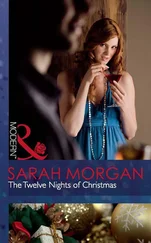Carol-Lynn Waugh - The Twelve Crimes of Christmas
Здесь есть возможность читать онлайн «Carol-Lynn Waugh - The Twelve Crimes of Christmas» весь текст электронной книги совершенно бесплатно (целиком полную версию без сокращений). В некоторых случаях можно слушать аудио, скачать через торрент в формате fb2 и присутствует краткое содержание. Жанр: Триллер, на английском языке. Описание произведения, (предисловие) а так же отзывы посетителей доступны на портале библиотеки ЛибКат.
- Название:The Twelve Crimes of Christmas
- Автор:
- Жанр:
- Год:неизвестен
- ISBN:нет данных
- Рейтинг книги:3 / 5. Голосов: 1
-
Избранное:Добавить в избранное
- Отзывы:
-
Ваша оценка:
- 60
- 1
- 2
- 3
- 4
- 5
The Twelve Crimes of Christmas: краткое содержание, описание и аннотация
Предлагаем к чтению аннотацию, описание, краткое содержание или предисловие (зависит от того, что написал сам автор книги «The Twelve Crimes of Christmas»). Если вы не нашли необходимую информацию о книге — напишите в комментариях, мы постараемся отыскать её.
The Twelve Crimes of Christmas — читать онлайн бесплатно полную книгу (весь текст) целиком
Ниже представлен текст книги, разбитый по страницам. Система сохранения места последней прочитанной страницы, позволяет с удобством читать онлайн бесплатно книгу «The Twelve Crimes of Christmas», без необходимости каждый раз заново искать на чём Вы остановились. Поставьте закладку, и сможете в любой момент перейти на страницу, на которой закончили чтение.
Интервал:
Закладка:
I could still smell the dry rot of the house in my nostrils, and I knew it would take days before I could get it out of my clothes.
“This is one day I’d like to cut out of the calendar permanently,” I said.
“And leave them alone to their troubles. It would serve them right.”
“They’re not alone,” I said. “Jessie is with them. Jessie will always be with them until that house and everything in it is gone.”
Al frowned. “It’s the queerest thing that ever happened in this town, all right. The house all black, her running through the streets like something hunted, him lying there in that room with only the walls to look at, for-when was it Jessie took that fall, counsellor?”
By shifting my eyes a little I could see in the mirror behind Al the reflection of my own face: ruddy, deep jowled, a little incredulous.
“Twenty years ago,” I heard myself saying. “Just twenty years ago tonight.”
THE ADVENTURE OF THE UNIQUE DICKENSIANS by August Derleth
If imitation is the sincerest form of flattery, the plethora of Holmesian pastiches produced since the 1880s might have been gratifying to Sir Arthur Conan Doyle, had not so many of them been so poor.
Among the best of the imitators of the Sacred Writings was August (William) Derleth, who was born in Sauk City, Wisconsin, and who, starting at the age of thirteen, produced a large and varied collection of literary products. Cofounder of Arkham House and Mycraft & Moran, publishers of supernatural and mystery books, he claimed that he was “the most versatile and voluminous writer in quality writing fields.” Mystery fans, however, remember him for his creation of Solar Pons.
“This Christmas season,” said Solar Pons from his place at the windows of our quarters at 7B, Praed Street, “holds the promise of being a merry one, after the quiet week just past. Flakes of snow are dancing in the air, and what I see below enchants me. Just step over here, Parker, and have a look.”
I turned down the book I was reading and went over to stand beside him.
Outside, the snowflakes were large and soft, shrouding the streetlight, which had come on early in the winter dusk, and enclosing, like a vision from the past, the scene at the curb-a hansom cab, no less, drawn by a horse that looked almost as ancient as the vehicle, for it stood with a dejected air while its master got out of the cab, leaning on his stick.
“It has been years since I have seen a hansom cab,” I said. “Ten, at least-if not more. And that must surely be its owner.”
The man getting out of the cab could be seen but dimly, but he wore a coat of ankle length, fitting his thin frame almost like an outer skin, and an old beaver hat that added its height to his, and when he turned to look up at the number above our outer entrance, I saw that he wore a grizzled beard and square spectacles.
“Could he have the wrong address?” I wondered.
“I fervently hope not,” said Pons. “The wrong century, perhaps, but not, I pray, the wrong address.”
“No, he is coming in.”
“Capital, capital!” cried Pons, rubbing his hands together and turning from the window to look expectantly toward the door.
We listened in silence as he applied below to Mrs. Johnson, our landlady, and then to his climbing the stairs, a little wheezily, but withal more like a young man than an old.
“But he clutches the rail,” said Pons, as if he had read my thoughts. “Listen to his nails scrape the wall.”
At the first touch of the old fellow’s stick on the door, Pons strode forward to throw it open.
“Mr. Solar Pons?” asked our visitor in a thin, rather querulous voice.
“Pray come in, sir,” said Pons.
“Before I do, I’ll want to know how much it will cost,” said our client.
“It costs nothing to come in,” said Pons, his eyes dancing.
“Everything is so dear these days,” complained the old fellow as he entered our quarters. “And money isn’t easily come by. And too readily spent, sir, too readily spent.”
I offered him a seat, and took his hat.
He wore, I saw now, the kind of black half-gloves customarily worn by clerks, that came over his wrists to his knuckles. Seeing me as for the first time, he pointed his cane at me and asked of Pons, “Who’s he?”
“Dr. Parker is my companion.”
He looked me up and down suspiciously, pushing his thin lips out and sucking them in, his eyes narrowed. His skin was the color of parchment, and his clothes, like his hat, were green with age.
“But you have the advantage of us, sir,” said Pons.
“My name is Ebenezer Snawley.” Then he turned to me and stuck out an arm. “They’re Pip’s,” he said, referring to the clerical cuffs, which I saw now they were. “No need for him to wear ’em. He’s inside, and I’m out, and it would be a shameful waste to spend good money on gloves for the few times I go out in such weather.” His eyes narrowed a trifle more. “Are you a medical man?”
I assured him that I was.
“Have a look at that, Doctor,” he said, indicating a small growth on one finger.
I examined it and pronounced it the beginning of a wart.
“Ah, then it’s of no danger to my health. I thank you. As you’re not in your office, no doubt there’ll be no fee.”
“Doctor Parker is a poor man,” said Pons.
“So am I, sir. So am I,” said Snawley. “But I had to come to you,” he added in an aggrieved voice. “The police only laugh at me. I applied to them to have the nuisance stopped.”
“What is the nature of the nuisance?” asked Pons.
“Aha! you’ve not told me your fee for consultation,” said Snawley.
“I am accustomed to setting my fee in accordance with the amount of work I must do,” said Pons. “In some cases there is no fee at all.”
“No fee? No fee at all?”
“We do on occasion manifest the spirit of Christmas,” continued Pons.
“Christmas! Humbug!” protested our client.
“Do not say so,” said Pons.
“Christmas is a time for well-meaning fools to go about bestowing useless gifts on other fools,” our client went on testily.
“But you did not come to discuss the season,” said Pons gently.
“You are right, sir. I thank you for reminding me. I came because of late I have been much troubled by some fellow who marches up and down before my house bawling street songs.”
“Are they offensive songs?”
Our visitor shook his head irritably. “Any song is offensive if I do not wish to hear it.”
“Scurrilous?”
“Street songs.”
“Do you know their words?”
“Indeed, and I do, Mr. Pons. And I should. ‘Crack ’em and try ’em, before you buy ’em eight-a-penny. All new walnuts. Crack ’em and try ’em, before you buy ’em. A shilling a-hundred. All new walnuts,’ ” he said in mimicry. “And such as ‘Rope mat! Doormat! You really must buy one to save the mud and dust; think of the dirt brought from the street for the want of a mat to wipe your feet!’ Indeed I do know them. They are old London street cries.”
Pons’s eyes now fairly glowed with pleasure. “Ah, he sells walnuts and rope mats.”
“A ragbag of a fellow. Sometimes it is hats-three, four at a time on his head. Sometimes it is cress. Sometimes flowers. And ever and anon walnuts. I could not chew ’em even if I bought ’em-and there’s small likelihood of that. Catch me wasting good money like that! Not likely.”
“He has a right to the street,” observed Pons.
“But Mr. Pons, sir, he limits himself to the street along my property. My house is on the corner, set back a trifle, with a bit of land around it-I like my privacy. He goes no farther than the edge of my property on the one side, then back around the corner to the line of my property on the other. It is all done to annoy me-or for some other reason-perhaps to get into the house and lay hands on my valuables.”
Читать дальшеИнтервал:
Закладка:
Похожие книги на «The Twelve Crimes of Christmas»
Представляем Вашему вниманию похожие книги на «The Twelve Crimes of Christmas» списком для выбора. Мы отобрали схожую по названию и смыслу литературу в надежде предоставить читателям больше вариантов отыскать новые, интересные, ещё непрочитанные произведения.
Обсуждение, отзывы о книге «The Twelve Crimes of Christmas» и просто собственные мнения читателей. Оставьте ваши комментарии, напишите, что Вы думаете о произведении, его смысле или главных героях. Укажите что конкретно понравилось, а что нет, и почему Вы так считаете.
